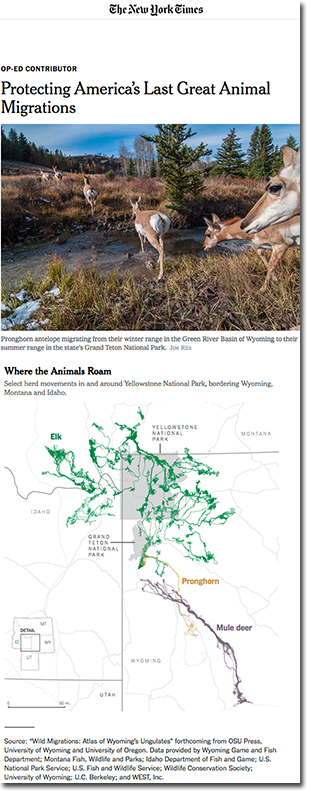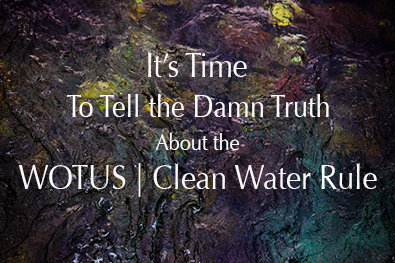 Some might ask ‘why in the hell fly fisher folk should give a damn about migration of big Western four-legged critters, namely elk, pronghorns, and mule deer?’
Some might ask ‘why in the hell fly fisher folk should give a damn about migration of big Western four-legged critters, namely elk, pronghorns, and mule deer?’
The answer is obvious for those who spend any time at all marveling at the wildlife surrounding them as they pursue fishy critters along the mighty rivers of the West, or even the simple act of driving anywhere in the Greater Yellowstone Ecosystem (though it will require putting down your damned phone and actually paying attention to the world around you).
Back on February 23rd an article popped up on the New York Times opinion page – Protecting America’s Last Great Animal Migrations; the images to the right and the excerpt below are from the article –
The interior secretary, Ryan Zinke, recently directed the agencies in his department to work with states and private landowners to minimize development and disturbance in migration corridors and winter ranges used by elk, mule deer and pronghorn antelope.
Because the Trump administration has otherwise reduced many land and wildlife protections, the move was immediately dismissed by some environmental groups as “greenwashing.” But Mr. Zinke’s order is based on solid ecological science, and it reflects broad support in conservative Western states for protecting a natural wonder important to ecosystems and rural communities.
These animals make long, arduous journeys across the most rugged of Western landscapes. My colleagues and I have tracked herds that travel a hundred miles or more each year, struggling across snowbound mountain ranges and raging rivers. They endure all this because the rewards outweigh the risks: The herds can fatten up on green grass in the high country all summer, then shelter all winter in the valleys and on the plains, away from the deep mountain snow.
These migratory herds are the lifeblood of many Western landscapes. They sustain apex predators like wolves, grizzly bears and mountain lions; diverse scavengers like eagles and foxes; and businesses that cater to hunters and wildlife watchers. That’s why protecting the migrations of these big-game animals is becoming a priority for a wide spectrum of Westerners from environmentalists to hunters to ranchers…
The article is a worthy read for those of you with interests in the Greater Yellowstone and West in general, and before you scoff at praise of Zinke, do note that the article was penned by a prof (Arthur Middleton) at UC Berkeley, hardly a bastion of conservative thought and praise. He’s right on the money about the need to preserve the corridors, and the challenges Wyoming in particular faces in getting this done.

